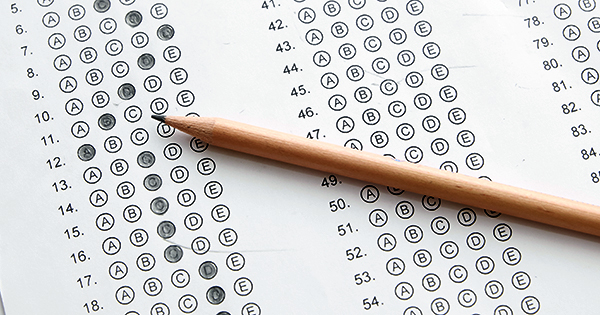Do Standardized Tests Actually Help Us?

Standardized test form with answers bubbled in and a pencil, focus on anser sheet
January 30, 2023
With studying for the SAT, ACT, or AP exams, and also taking state exams required for graduation, most students have their fair share of standardized tests.
These tests have been around for as long as most of us can remember, even going back to the elementary school days of PARCC. There have always been questions about the value of standardized testing, and if they really benefit students’ education.
Federally, all students in public schools from third to eighth grade are required to take a yearly math and reading assessment. All high school students are also required to take an assessment once, to measure if the school is meeting the state’s standards and if students will succeed in college-level courses.
However, access to an education that prepares students for college is still unequal and depends on factors like location, race, and socioeconomic status.
Test questions can often be biased, as Young Whan Choi, Manager of Performance Assessments in Oakland Unified School District, California, pointed out: “a student called me over with a question. With a puzzled look, she pointed to the prompt asking students to write about the qualities of someone who would deserve a ‘key to the city.’ Many of my students, nearly all of whom qualified for free and reduced lunch, were not familiar with the idea of a ‘key to the city.’” These questions can assume knowledge that some students may not understand, leading to skewed results.
A 2018 study at Stanford also found that test format accounts for 25% of gender differences in reading and math assessments, with girls performing better on open-ended questions rather than multiple choice.
Critics also point out that standardized tests don’t accurately predict success in college and beyond, only evaluating general knowledge rather than creativity, artistic talents, etc.
Test scores can be influenced by a number of outside factors; they serve to measure who is good at taking tests, and who is not. A good test score does not necessarily mean an adequate understanding of the subject, and vice versa.
With these concerns surrounding standardized tests, many colleges have implemented test-optional policies for their admissions processes, and these exams are becoming less relevant in pursuing higher education, such as Ph.D. programs and law schools.
There are still benefits to this kind of testing, despite the disadvantages. They give educators a measure of how students are progressing, and what areas call for improvement. The information that comes from test results can also identify students in need of help.
“I think standardized tests can be really exhausting for students, but they do have their advantages in seeing how schools are doing. We just need to keep in mind that they aren’t always going to be 100% accurate in assessing every student,” commented Hills senior Rahaf AlSattari.





